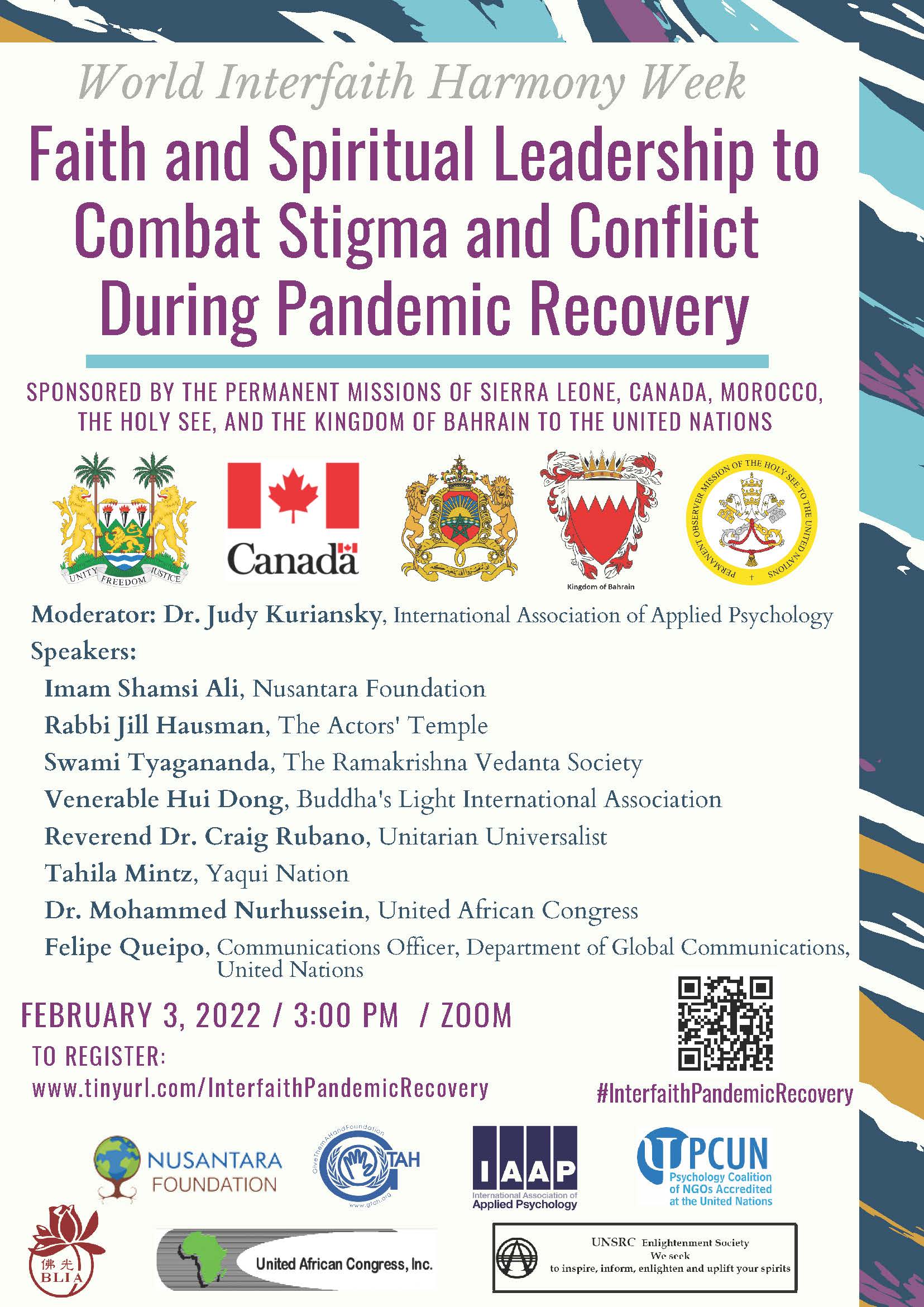
https://www.un.org/en/observances/interfaith-harmony-week
Recognizing the imperative need for dialogue among different faiths and religions to enhance mutual understanding, harmony and cooperation among people, the General Assembly encourages all States to spread the message of interfaith harmony and goodwill in the world’s churches, mosques, synagogues, temples and other places of worship during that week, on a voluntary basis and according to their own religious traditions or convictions.
Faith and spiritual leadership to combat stigma and conflict during pandemic recovery
3 February 2022, 3:00 p.m.
Join the virtual meeting of faith and spiritual leaders, which this year is of particularly importance, in light of the COVID-19 pandemic which has upended all assumptions of life on earth, causing never-before faced challenges worldwide. #InterfaithPandemicRecovery
Origin
World Interfaith Harmony Week (WIHW), conceived to promote a culture peace and nonviolence, was first proposed by King Abdullah II of Jordan at the United Nations in 2010. This was quickly adopted by the UN General Assembly (resolution A/RES/65/5), declaring the first week of February each year as World Interfaith Harmony week, calling on governments, institutions and civil society to observe it with various programs and initiatives that would promote the aim of the WIHW objectives.
2012
The United African Congress and Give Them a Hand Foundation heeded the call by organizing an interfaith forum at the UN in 2012 and have continued to be involved every year ever since. They chose for their theme “The Diaspora-a Force for Positive Change” citing the ability of immigrant communities of diverse backgrounds, faiths and ethnicities in the United States to live side by side harmoniously bound together by shared values, love of God and love of neighbor. The interfaith forum gathered Christian, Muslim, Jewish, Hindu and Buddhist faith leaders to talk about the teachings of their respective faiths as it relates to peace and harmony. The forum was co-sponsored by the Permanent Mission of the Federal Democratic Republic of Ethiopia to the United Nations.
2013
They followed this up in 2013 by extending this gathering to include the faith and value systems of indigenous peoples by inviting an African spiritual leader who flew in from Guinea to participate. The core of his message was not only the need for people to live in peace but also the interdependence of humans with nature, hence the need to be good custodians of our environment. His inclusion garnered tremendous amount of interest among the diplomats at the UN and among the wide spectrum of invited guests.
2014
For the 2014 WIHW the theme was “Tolerance, Reconciliation and Forgiveness” in honour of the late Nelson Mandela, who led South Africa during its critical transition from Apartheid to a thriving multicultural all-inclusive democracy, thus helping his country avoid what could have been a disastrous racial war. His personal example of forgiveness for the sake of peace among his people resonated throughout the world. The Mission of Indonesia to the UN joined the Mission of Ethiopia in co-sponsoring the event.
2015
In the aftermath of the devastating Hurricane Sandy many homes were destroyed in and around New York City. The United African Congress and its partners organized hundreds of interfaith volunteers to help clean up flooded homes and deliver food to affected communities. Recognizing the power of prayer and interfaith collaboration, the theme for the 2015 WIHW program became “Interfaith Prayer, Healing, and Community Services in the Cause of Peace”. It was a prime example of people of different faiths, colors and ethnicities working together for the common good. The Missions to the UN of Ethiopia, Indonesia and Jamaica were co-sponsors.
2016
In 2016 the UN launched the 2030 Sustainable Development Goals. It was also the year when one of the worst global health emergencies, the Ebola pandemic that devastated Guinea, Sierra Leone and Liberia was winding down after claiming more than 11000 lives. The United African Congress was among the first to call attention to the looming health emergency as early as August 2014 by holding an awareness-raising forum at the UN, followed by a concert held at the General Assembly Hall in March 2015.
Noting the interconnectedness of the quest for peace and harmony with the global health emergencies, such as the Ebola pandemic spreading across boundaries and with the 2030 UN agenda for Sustainable Development Goals, the theme for the 2016 WIHW was “Building Bridges across Boundaries.” To underscore the significance of the theme they invited Native American Spiritual leader, the ceremonial ritualist from the Mohawk Nation to participate with the other faith leaders. The spirituality that the Native American speaker imparted - through chants and dance- the need to protect ‘Mother Earth that nurtures and sustains us’ was warmly and widely embraced.
2019
At the core of all the faith systems and traditions is the recognition that we are all in this together and that we need to love and support one another to live in harmony and peace in an environmentally sustainable world. Our world continues to be beset by conflict and intolerance with rising number of refugees and the internally displaced in a hostile and unwelcoming world around them. We are also unfortunately witnessing messages of hate spreading discord among people. The need for spiritual guidance has never been greater. It is imperative that we double our efforts to spread the message of good neighborliness based on our common humanity, a message shared by all faith traditions. The theme for the observance of the Interfaith Harmony Week for 2019 was, therefore, “Sustainable Development through Interfaith Harmony.”











Add new comment